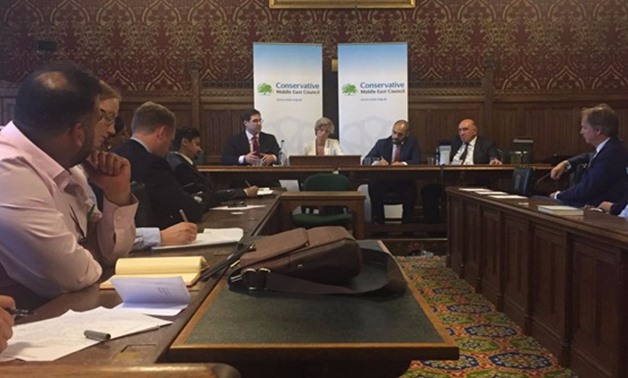
CMEC's discussion on the Qatari crisis- Press photo
Charlotte Leslie, CMEC director, chaired a wide-ranging discussion on the ongoing Qatar-Gulf diplomatic crisis in the UK Parliament.
Sir William Patey, former British Ambassador to Saudi Arabia, said that Qatar has played a major role in the Arab Spring, and allegedly supported extreme militias.
"I do not agree with Saudi Arabia and the U.A.E in terms of cutting diplomatic ties with Qatar, but if I were in the same situation, I would accept their position." said Patey.
He pointed out that there are two hostile alliances in the region; Saudi Arabia's allies and Iran's allies, noting that Iran and Qatar support radical Shiite and Sunni militias, including the Muslim Brotherhood.
"In my opinion, the current Qatar-Gulf diplomatic crisis came as a result of the close relation between Saudi Arabia and the new American administration that supported the Saudi counter-terrorism approach, including boycotting Qatar."
Patey cited the Saudi's good relation with Trump as the reason behind creating the required environment to change Qatar's behavior.
Therefore, we can see that Saudi Arabia and the U.A.E could issue such list of demands from Qatar, supported by Trump's approval, he explained.
"It seems that Qatar is aware that it cannot escalate the situation, so it is trying to use diplomacy to absorb the crisis, while Saudi Arabia and the U.A.E are moving as far as possible," according to Patey.
He expressed his concerns over the impact of this crisis on the future of the Gulf Cooperation Council (GCC), asserting that Qatar has huge savings and massive gas reserves, which make sanctions against them inefficient as required
Patey said that the Crown Prince Mohammed bin Salman has found a common ground with Sheikh Mohammed bin Zayed, prompting the two leaders to boycott Qatar.
"I think that cutting diplomatic ties with Qatar was not smart enough, although I understand the concerns of Saudi Arabia and the U.A.E.," he added.
Patey expected that this situation is led by Saudi Arabia and Abu Dhabi, not the U.A.E. as a whole, because this decision does not serve Dubai's interests.
“Qatar has links with extremists in Bahrain, such as the Hezbollah Brigades, not to mention its links with Al-Qaeda in Syria,” Bahraini political economist and researcher, Hasan Tariq Al Hasan said.
“It also utilized Al Jazeera as a media arm for extreme organizations such as the Muslim Brotherhood all the way to Al Qaeda.”
Hassan also added that the Riyadh Summit and the united efforts to combat terrorism will not tolerate the disruptive role that Qatar plays by supporting terrorism.
Moreover, Hassan commended British Foreign Secretary Boris Johnson for calling on Qatar to do more to clamp down on the funding of extremist groups.
Speaking after meeting Qatari foreign minister, Sheikh Mohammed bin Abdulrahman al-Thani, in London, Johnson called on Qatar to heed its neighbors’ concerns.
He also touched on U.S.A.’s efforts to find a solution for the crisis and push Qatar to subject to the demands set by the four Arab states leading the boycott against Qatar.
“Eventually, I think the solution cannot be achieved without diplomatic efforts and closed meetings between Gulf States,” Hassan added.
The new Saudi leadership presented by the crown prince Mohammad Bin Salman is closer than ever to the Emirati policies, as the young Saudi leader is willing to continue the pressure on rich-gas tiny country of Qatar”, said Michael Stephens, research Fellow for the Middle East & Head of RUSI Qatar.
Stephens excluded the possibility of Qatar changing its current policies, stressing on the negative consequences this political crisis bears for the region.
“The crisis negatively affect the international economy”, said Stephens, adding that he has been frequently asked by investors lately, if it is safer from them- the investors- to shut their businesses in gulf cities such as Dubai, that could be likely vulnerable to instability given the political rift.
The international society should not bias against any of crisis’s parts, Stephens states, adding that the tiny emirate is witnessing an economic burden. However, it could persist in its policies for further years, Stephens stressed.
“Accusing Qatar of funding terrorism is pointless, as several Gulf States are involved in the Syrian dilemma, let alone the tiny Emirate. According to Intelligence bodies, most of the financial fund collected by Al-Nusra front came from Kuwaiti charities.”, added Stephens.
The fellow research refuted the possibilities of a Qatari-Iranian approach, adding that the tiny emirate is close to the Persian republic for tactical reasons.
Stephens said that Western nations must find a resolve the Gulf States dispute, contain the Iranian dominance in the region, and unifying the Gulf monarchies.

Comments
Leave a Comment